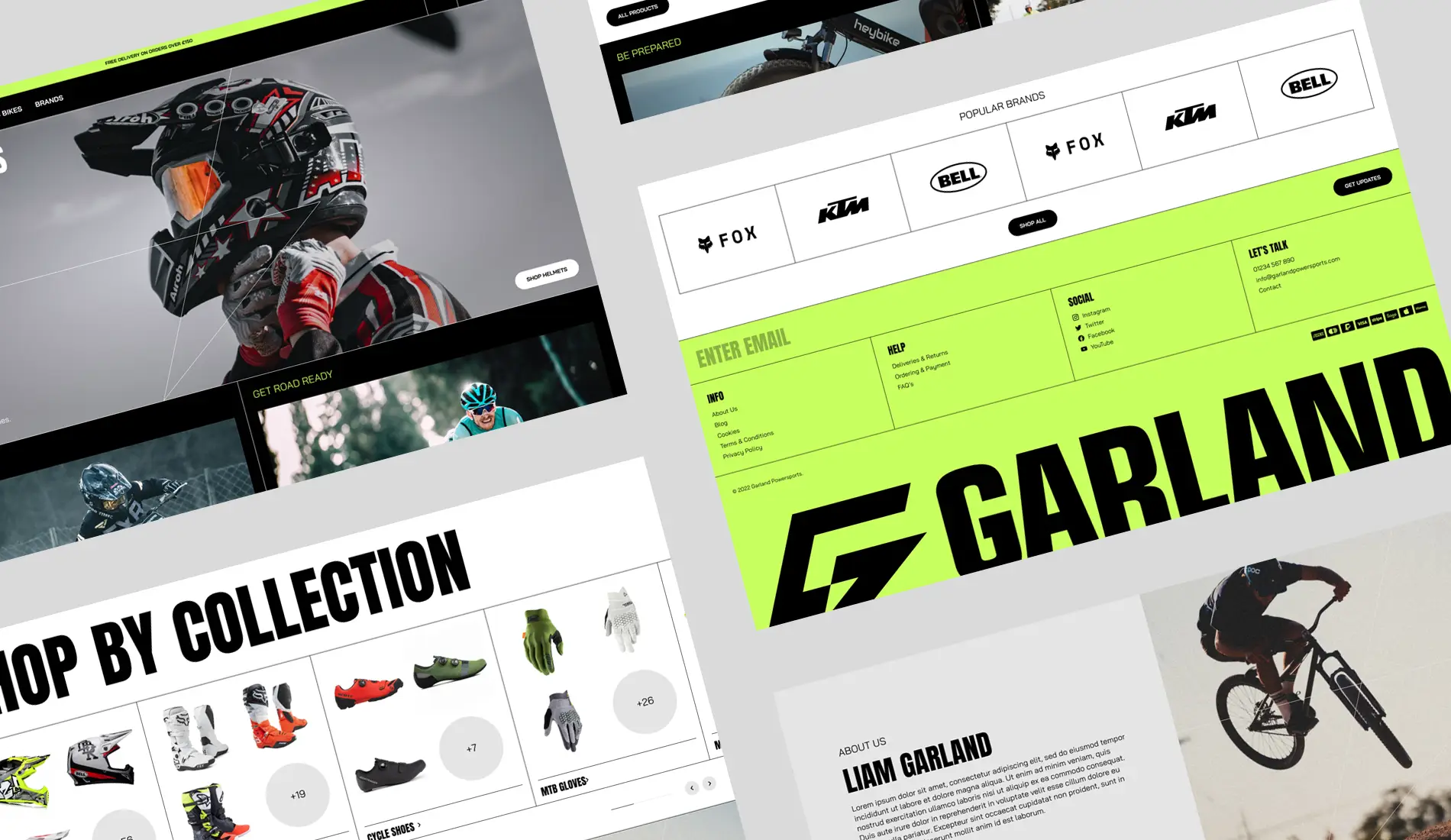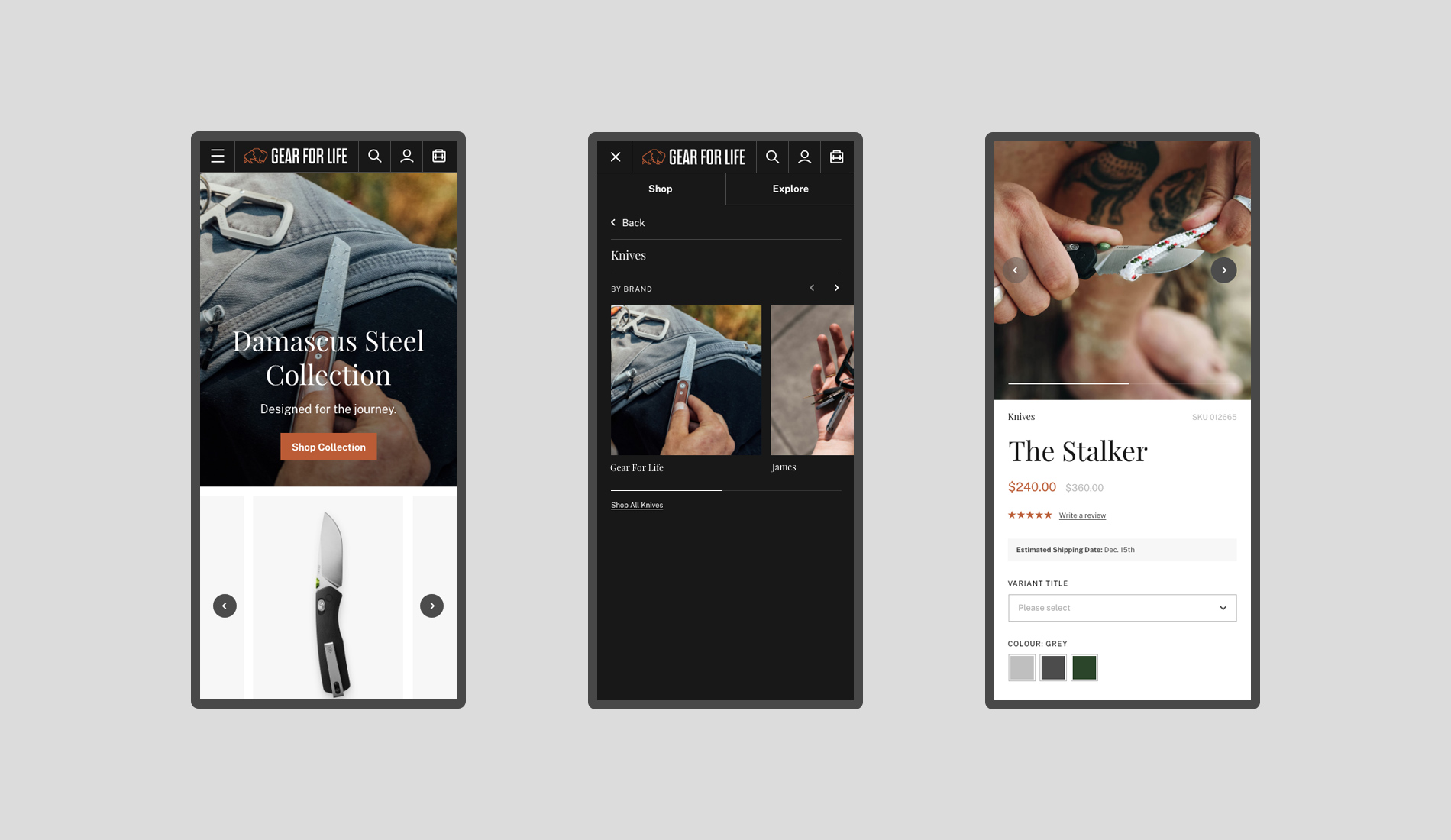Shopify and BigCommerce are two of the biggest players in the e-commerce market. They offer powerful tools and intuitive user interfaces to help merchants set up quickly and sell more online.
In this guide, we’ll compare Shopify and BigCommerce, examining their primary features, pricing structures, customisation options, SEO tools, and more.
By the end, we hope to have given you a comprehensive insight into which platform, Shopify or BigCommerce, is better suited for your business and your eCommerce needs.
This Article Will Cover:
- 1. Shopify vs BigCommerce: Which ecommerce platform is better?
- 2. User Experience & CMS
- 3. Pricing
- 4. Design & Customisation
- 5. App & Integration Ecosystem
- 6. SEO Features
- 7. Security and Performance: Shopify vs. BigCommerce
- 8. Scalability & Performance
- 9. Payment Options & Fees
- 10. Internationalisation & Localisation
- 11. Multichannel Selling
- 12. Shopify vs BigCommerce: Comparing the Platforms
- Conclusion
- FAQ
1. Shopify vs BigCommerce: Which ecommerce platform is better?
If you’re looking into tools to take your store online, then we’re going to bet that you’ve heard of these two heavyweights of the eCommerce market: Shopify and BigCommerce. They are renowned for their comprehensive and feature-packed solutions that empower businesses to kickstart and expand their online storefronts.
Shopify and BigCommerce offer a suite of powerful tools designed to streamline the creation and management of an online store. Both offer free trials, allowing you to test and evaluate their offerings to find the perfect fit for your unique requirements. Despite the many parallels between these two e-commerce platforms, there are standout features that might make you want to consider one or the other.
In this guide, we’ll cover everything from basic functionalities to the advantages and disadvantages, including aspects such as starter templates, the range of available apps, and customer feedback. Whether you’re managing a small shop or running a large store, this guide will aid you in choosing the most suitable platform for your e-commerce journey.
You Might Want To Read: What Is Shopify and How Does It Work?
2. User Experience & CMS
Shopify’s CMS
Renowned for its straightforward design, Shopify delivers an intuitive content management system (CMS) that eliminates the need for coding expertise. With its simple drag-and-drop editor, users can quickly build a professional-looking e-commerce site. Shopify’s user-friendly interface is an ideal option for novices. Both platforms have a step-by-step setup experience. Shopify’s setup wizard is frequently commended for its straightforward, user-friendly experience, guiding you through critical steps to launch an online shop, including theme selection, payment gateway, and shipping setup. Shopify and BigCommerce both provide a customer helpdesk through email, live chat, and phone support. Shopify, in particular, is often highlighted for its superior customer assistance, offering round-the-clock availability and fast response times.
BigCommerce’s CMS
BigCommerce also has a user-friendly interface but a more sophisticated approach to setting up a store, which might introduce a slightly steeper learning curve compared to Shopify. BigCommerce is geared towards more seasoned merchants with enhanced control over their store’s aesthetics and functionalities. The initial setup with BigCommerce is clear-cut, though it might require more time and patience to tailor your store thoroughly. Some users may perceive its backend navigation and structure as more intricate than Shopify’s. Despite this, BigCommerce boasts a great customer service team to assist store owners in navigating the platform, although as a BigCommerce agency, we have experienced marginally slower response times compared to Shopify.
Need help?
Our web design agency specialises in Shopify and BigCommerce, and alternatives like WooCommerce. We can even help you migrate away from bloated and heavier platforms like Adobe Commerce (Magento). Everything we design and build is bespoke to you. You won’t need to get down and dirty with any code, and you’ll have a store design that is unique to you and that no one else will own. So why not speak to one of our Shopify or BigCommerce experts to take your store to the next level?
You Might Want To Read: WooCommerce vs Shopify: Which Is Better & Why?
3. Pricing
Shopify Pricing
Shopify offers a range of pricing plans to fit the needs and budgets of different businesses. The basic plan starts at £25 per month and includes all the essential features to get your online store up and running. This plan is perfect for small businesses and startups seeking an online presence. In contrast, the more advanced plans range from £65 to £344 monthly (as of August 2023).

These plans include hosting, an SSL certificate, and access to Shopify’s features and tools. However, it’s worth noting that some advanced features may require additional fees or the use of third-party apps.
If you’re looking for more advanced features and customisation options, Shopify offers Shopify Plus, designed for high-growth businesses and enterprise-level merchants. While the pricing for Shopify Plus varies depending on your specific requirements, it starts at around $2,000 per month. With Shopify Plus, you can access exclusive APIs, unlimited customisation options, and priority support.
Here’s a full breakdown of what Shopify costs. All prices are accurate as of August 2023:
| Plan | Monthly fee | In-person transaction fee | Online transaction fee | Non-Shopify Payments fee |
|---|---|---|---|---|
| Shopify Starter | $5 per month | 5% | 5% cents | 2% |
| Basic | $29 per month | 2.7% | 2.9% plus 30 cents | 2% |
| Shopify | $79 per month | 2.5% | 2.6% plus 30 cents | 1% |
| Advanced | $299 per month | 2.4% | 2.9% plus 30 cents | 0.5% |
| Shopify Plus | Quote-based | Based on your credit card sales volume | Based on your credit card sales volume | 0.15% |
As a trusted Shopify agency, we can take you through the options and help you decide which plan fits for now and in the future. If you need assistance with setting up and customising your Shopify store, you can also hire our team of Shopify developers who’ve shaped our agency and have the expertise to build custom features and functionality for your store, offer end-to-end services and help you launch and grow your business. There are many reputable UK Shopify agencies, but we consider ourselves one of the best.
BigCommerce Pricing
BigCommerce offers a variety of pricing plans designed to support businesses, from startups to large enterprises. Its pricing structure includes the Standard plan at $39 monthly, Plus at $105 monthly, Pro at $399 monthly, and Enterprise, which is custom-priced to fit specific business requirements. These scalable options ensure businesses of any scale can find a suitable plan. BigCommerce invites new users to explore its platform with a 15-day free trial, providing an opportunity to assess its fit for your business needs without immediate commitment.
| Plan | Monthly Price | Sales Limit | Main Features |
|---|---|---|---|
| Standard | $29 | Up to $50k | Unlimited products, file storage, and bandwidth; 24/7 support |
| Plus | $79 | Up to $180k | All Standard features, plus customer groups and segmentation, abandoned cart saver |
| Pro | $299 | Up to $400k | All Plus features, plus Google customer reviews, product filtering |
| Enterprise | Custom Pricing | Custom | Custom features, advanced integrations, and priority support |
However, for all its strengths, BigCommerce introduces a unique pricing structure that may require consideration, especially by businesses experiencing rapid growth. The pricing tiers above are based on annual sales volume, meaning that as a business’s sales increase, it may be moved to a higher pricing tier. While this model supports scaling by aligning the platform’s costs with the merchant’s success, it can also lead to increased expenses as sales volumes grow. This aspect of BigCommerce’s pricing warrants careful planning and budgeting by businesses to ensure that the platform remains a cost-effective solution throughout their growth trajectory.
You Might Want To Read: 8 Must-Have Features for eCommerce Websites
4. Design & Customisation
When exploring design and customisation capabilities, Shopify and BigCommerce stand out for their comprehensive offerings that enable the creation of engaging and tailored online storefronts. As a web design agency that enjoys working on both platforms, we love being able to create stunning stores for our clients. Both give us the ability to do pretty much anything visually.
Shopify Customisation
Shopify shines with its extensive assortment of professionally crafted themes and templates, catering to a wide range of business sectors with both complimentary and premium options. Its theme editor and HTML/CSS access allow for detailed customisation to align with your brand identity. Shopify’s Theme Editor grants significant control over visual elements like colours and fonts, for a distinctive store aesthetic. Nevertheless, those lacking coding expertise or access to a web designer may find their customisation possibilities somewhat limited.

That’s where we can step in. Our team of Shopify experts can work with Shopify’s Liquid templating language to unlock advanced customisation of a store’s design/theme and to give you that polish you’re after.
BigCommerce Customisation
On the other hand, BigCommerce offers a variety of adaptable themes and customisation features that are both responsive and conversion-optimised. Like Shopify, the platform has a rich toolkit for design, including access to HTML/CSS and the Stencil framework, which opens the door to advanced customisation for those who can code.

BigCommerce employs the Handlebars templating language, providing its own customisation options. However, like with Shopify, newcomers might find Handlebars presents a somewhat more challenging learning curve compared to Shopify’s Liquid framework, potentially requiring a bit more effort to master for those seeking to customise their site.
If you’re considering BigCommerce, speak to us. Our developers and designers are on standby to take your BigCommerce store to the next level.
5. App & Integration Ecosystem
Shopify’s App Ecosystem
Shopify’s App Store stands out with its comprehensive and diverse range of third-party apps and plugins. It encompasses thousands of options across many categories, such as marketing, sales, inventory management, and customer support. This extensive assortment affords users unparalleled flexibility, allowing them to amplify their store’s capabilities to meet precise requirements.
Notably, Shopify places a strong emphasis on app quality. Each application undergoes a rigorous review process before listing, ensuring reliability, security, and a smooth user experience. The ecosystem features a wide array of free and premium apps, accommodating businesses of various scales and sectors.
Shopify also excels in its integrations with leading third-party services, including social media channels (Facebook, Instagram), email marketing platforms (Mailchimp, Klaviyo), shipping services (UPS, FedEx), and accounting tools (QuickBooks, Xero), alongside innovative options like YouTube selling. These integrations foster efficient connectivity between Shopify stores and essential business tools, streamlining operations and enhancing functionality.
You Might Want To Read: What Is Shopify and How Does It Work?
BigCommerce’s App Selection
Although BigCommerce’s App Store may seem less extensive than Shopify’s, it still presents a robust selection of apps and integrations. The store offers essential apps across key categories, such as marketing, analytics, shipping, and payment solutions, effectively supporting the fundamental needs of online store management.
BigCommerce is committed to app quality, ensuring each app is trustworthy and secure, with a balanced mix of complimentary and paid apps tailored to meet diverse business requirements. While the variety may not rival Shopify’s, the available apps deliver critical features and functionality.
Integration-wise, BigCommerce connects seamlessly with major platforms and services, including Facebook, Google Analytics, PayPal, UPS, and USPS, enabling straightforward integration with vital marketing, analytics, shipping, and payment processing tools. Although its range of integrations might not be as broad as Shopify’s, BigCommerce covers the essential connections necessary for managing an online store.
6. SEO Features
Shopify SEO Tools
Shopify’s clean, structured code base lays a robust foundation for SEO. It enables customisation of title tags, meta descriptions, and URLs, helping to optimise your pages for search engines. Shopify incorporates built-in SEO functionalities such as adjustable headings, image alt tags, and the automatic creation of sitemaps, all of which aid search engines in understanding your store’s content and boosting its search visibility.
Furthermore, Shopify’s App Store is home to many SEO-focused apps and plugins, offering enhancements like sophisticated keyword optimisation, schema markup, and automated SEO audits, enriching your store’s SEO prowess.
BigCommerce SEO Strengths
BigCommerce boasts a search-focused platform, featuring customisable title tags, meta descriptions, and URLs to bolster your store’s search presence. A standout feature of BigCommerce is URL rewriting, granting you enhanced control over URL structure and the inclusion of keywords, which can significantly benefit your SEO strategy.
BigCommerce affords detailed management of page-level SEO elements, including meta tags, headings, and image alt tags. This allows for precise optimisation to elevate your store’s search result visibility.
The platform also allows agencies like us to build you SEO-friendly themes with clean coding and on-page optimisation best practices, laying a solid foundation for your SEO plans.
Integration capabilities with leading SEO tools, such as Google Analytics and Google Search Console, are seamlessly offered by BigCommerce, enabling you to monitor and refine your store’s search performance. These integrations provide critical insights, supporting informed decisions in your SEO optimisation efforts.
7. Security and Performance: Shopify vs. BigCommerce
Shopify’s Commitment to Security
Shopify promises a secure shopping environment for all online merchants. It implements SSL encryption to safeguard customer data during transactions and routinely conducts platform updates and security audits to mitigate vulnerabilities.
Achieving PCI DSS Level 1 certification, Shopify adheres to the highest security standards set by the payment card industry, guaranteeing that customer payment details are processed securely and in line with the strictest industry protocols.
As for its infrastructure, Shopify excels with its resilient setup, including multiple data centers that guarantee excellent uptime and store reliability. It handles all server maintenance and upgrades, effectively reducing downtime and ensuring your store remains open to customers without interruption.
Shopify also dedicates considerable resources to performance optimisation, offering speedy and reliable hosting solutions. By utilising a global CDN and implementing advanced caching methods, Shopify ensures that your store loads quickly.

BigCommerce’s Security
Like Shopify, BigCommerce places a high priority on security, implementing rigorous measures to shield online storefronts and customer information. It provides SSL encryption and regular updates to its security protocols, aligning with industry best practices for a secure online environment.
BigCommerce shares the PCI DSS Level 1 certification with Shopify, and has as robust focus on uptime and reliability. BigCommerce’s infrastructure is built to manage significant traffic volumes while minimising downtime and continuously monitors server performance to ensure your store is accessible to shoppers.
Performance optimisation is a key area for BigCommerce, which aims to deliver fast-loading stores. Through the use of a global CDN, sophisticated caching strategies, and server-side enhancements, BigCommerce optimises page load speeds, ensuring customers enjoy a fluid and efficient shopping journey.
8. Scalability & Performance
Shopify’s Scalability Features
Shopify is an exceptionally scalable platform suitable for small startups and large enterprises. It offers a spectrum of subscription levels, from Basic to Advanced, culminating in Shopify Plus, each designed to accommodate the evolving needs and growth paths of various businesses. Shopify’s infrastructure is adept at managing high traffic volumes, ensuring smooth scalability as your store’s demand increases.
Shopify places a strong emphasis on performance optimisation, aiming to minimise page load times and enhance the overall shopping experience. It achieves this through dependable hosting, leveraging a global content delivery network (CDN), and implementing sophisticated caching methods to boost your online store’s efficiency.
As Shopify stores grow, merchants have the flexibility to progress through the platform’s subscription plans. This scalability is further supported by a wealth of third-party apps available in Shopify’s app store, which can extend the functionality of Shopify sites and positively impact key performance indicators such as conversion rates, average order values, and customer lifetime value.

BigCommerce’s Growth Potential
Like Shopify, BigCommerce is celebrated for its capacity to support business growth and expansion effortlessly. It offers a variety of subscription plans — Standard, Plus, and Pro — tailored to the needs of businesses of different scales. BigCommerce’s robust infrastructure is engineered to accommodate substantial traffic volumes, facilitating seamless growth as your enterprise scales.
BigCommerce also prioritises performance optimisation, ensuring that online stores load swiftly. This is achieved through a global CDN, advanced caching strategies, and server-side enhancements.
Moreover, BigCommerce boasts an extensive array of built-in functionalities that bolster both scalability and performance. Features such as sophisticated product options, versatile pricing rules, and comprehensive inventory management tools empower merchants to manage and expand their stores with ease.
9. Payment Options & Fees
Shopify Payment Solutions
Shopify offers an extensive array of payment gateway options, notably its proprietary solution, Shopify Payments, alongside support for numerous external gateways such as PayPal, Stripe, and Authorize.Net. This diversity allows merchants to select payment solutions that align with their business model and customer preferences.
Shopify Payments offers an integrated approach to accepting credit card payments directly through your store. It streamlines the setup process and provides competitive rates for transactions. Utilising Shopify Payments also bypasses the need to configure and manage a third-party payment gateway.
However, Shopify imposes transaction fees on sales made through external gateways. These fees fluctuate based on your subscription tier, with rates ranging from 0.5% to 2% per transaction for Basic and Shopify plans. Opting for higher-tier plans like Shopify Advanced and Shopify Plus typically results in lower transaction fees.
BigCommerce Payment Flexibility
BigCommerce also supports a wide selection of payment gateways, including major providers such as PayPal, Stripe, Square, and Authorize.Net. It caters to a broad spectrum of regional and international payment solutions, offering merchants the flexibility to choose gateways that best fit their operational and customer needs.
BigCommerce facilitates built-in payment capabilities, notably through PayPal powered by Braintree, allowing for direct credit card payments without additional configurations. This feature simplifies the payment process, enhancing the checkout experience for customers.
Unlike Shopify, BigCommerce does not levy transaction fees for sales. However, it’s important to note that the payment gateways themselves may impose their own fees, which can vary based on the provider and the terms of your contract with them.
| Platform | Own Payment Solution | Support for External Gateways | Transaction Fees with Own Solution | Transaction Fees with External Gateways | Notes |
|---|---|---|---|---|---|
| Shopify | Shopify Payments | Yes | 0% | 0.5% to 2% (varies by plan) | Fees for external gateways are waived if using Shopify Payments |
| BigCommerce | PayPal powered by Braintree | Yes | 0% | 0% | No platform transaction fees, but payment gateway fees apply |
10. Internationalisation & Localisation
Shopify’s International Features
Shopify extends its reach globally with multilingual capabilities facilitated through third-party applications. These applications empower merchants to translate their storefronts into various languages, offering a tailored shopping experience to a global audience. Within Shopify, managing multiple languages and currencies under a single storefront is possible.
Shopify incorporates an array of international payment methods to support its international customer base further. This diversity allows shoppers worldwide to transact in their preferred currencies. By supporting key global payment gateways, Shopify simplifies the purchasing process for international buyers.
Additionally, Shopify has established integrations with numerous shipping carriers alongside tools designed to optimize international logistics. Merchants can define shipping zones, accurately calculate shipping fees based on destination and package weight, and generate necessary customs documentation, streamlining the process of global order fulfilment.
BigCommerce’s Global Capabilities
Paralleling Shopify, BigCommerce provides multilingual support via third-party apps. These tools enable merchants to translate their store content, facilitating localized shopping experiences for customers across different regions. A single BigCommerce store can seamlessly manage multiple languages.
BigCommerce caters to an international clientele with its extensive support for international payment gateways. This feature ensures customers can make payments in their local currencies, enhancing the shopping experience. Through its integration with various payment services, BigCommerce guarantees smooth, secure transactions for its global customer base.
For international shipping, BigCommerce offers comprehensive built-in features. Merchants can establish shipping zones, implement specific shipping policies based on the destination and parcel weight, and print shipping labels directly. Integration with leading shipping carriers simplifies the complexities of international shipping and order fulfilment, ensuring merchants can efficiently serve customers worldwide.
11. Multichannel Selling
Shopify’s Multichannel Framework
Shopify excels in offering comprehensive multichannel selling capabilities, integrating effortlessly with various sales channels, including renowned online marketplaces like Amazon, eBay, and Etsy and social media platforms like Facebook and Instagram. This integration allows merchants to sell directly on these platforms while managing inventory, orders, and product listings from Shopify’s centralised dashboard.
Additionally, Shopify’s robust Point of Sale (POS) system supports in-person sales in physical stores or at pop-up events, syncing seamlessly with your online inventory and order management systems to provide a cohesive retail experience across digital and physical storefronts.
Shopify further embraces headless commerce, separating the frontend presentation layer from the backend e-commerce functionality. This flexibility enables merchants to craft customised shopping experiences or leverage specialised tools for diverse sales channels through Hydrogen & Oxygen. Beyond integrating with external platforms, Shopify facilitates the creation of bespoke sales channels, including wholesale or B2B portals, allowing for unified inventory and order management across all sales avenues. This omnichannel strategy ensures consistent operations and streamlined management across various selling environments.
BigCommerce’s Multichannel Capabilities
BigCommerce similarly enables merchants to broaden their sales horizons through integration with key sales channels, including major marketplaces like Amazon, eBay, and Walmart, and social media outlets like Facebook and Instagram. This allows for direct selling on these platforms and streamlines the management of your e-commerce activities.
BigCommerce matches Shopify in offering headless commerce capabilities, allowing merchants to decouple the front and backend for greater customisation and unique shopping experiences. Alongside headless commerce, BigCommerce’s omnichannel features encompass inventory synchronization, comprehensive order management, and centralized reporting, facilitating efficient oversight and management of sales across different platforms. This ensures a cohesive and streamlined operational approach, maintaining consistency across your online and offline sales channels.
12. Shopify vs BigCommerce: Comparing the Platforms
There’s a lot of information to consider. So, we’ve created a comparison summarising the primary distinctions between Shopify, and BigCommerce, the platforms we specialise in as a web design agency.
Our recommended choice
Either of these three platforms is a strong contender for your store; both have very similar features, BUT as a web design agency, we would have to say we do favour Shopify.
Why? Well, Shopify’s pricing structure seems fairer; it’s easier to build on and has more app support to take your store to that next level. Its dashboard inside the CMS is much more intuitive, and the level of support articles is mindblowing. Not to mention, its roadmap seems more extensive, probably because it runs many household name brands; it’s got to keep up with demand.
| Feature | Shopify | BigCommerce |
|---|---|---|
| Platform Type | Hosted | Hosted |
| Ease of Use | Very user-friendly | User-friendly |
| Customization | High (with limitations in the free themes) | High (with some limitations) |
| Payment Gateways | Supports 100+ gateways | Supports 65+ gateways |
| Scalability | Highly scalable | Highly scalable |
| SEO Capabilities | Strong | Strong, with built-in features |
| Integrations & Apps | Extensive app store | Wide range of built-in features and additional apps |
| Pricing | Subscription-based, starting at $29.95/month | Subscription based, starting at $29.95/month |
| Technical Support | 24/7 Support via chat, email, and phone | 24/7 Support via chat, email, and phone |
| Ideal For | Businesses of all sizes | Growing businesses and enterprises |
Conclusion
Choosing the right eCommerce platform is a critical decision that can influence the success of your online business. By carefully considering your business needs and evaluating each platform’s features, pricing, and potential limitations, you can select a solution that aligns with your goals.
You Might Want To Read: Discover the Best Shopify Alternatives: A Comprehensive Guide to eCommerce Platforms
Or skip that process and contact one of our eCommerce experts. We can continue the conversation on finding the ideal eCommerce solution for your business needs. Our comprehensive knowledge, insights, and information will help you make an informed decision. After all, we are a Shopify Partner Agency to boot.
You Might Want To Read: What Is A Shopify Partner? Everything You Need To Know
We’ll aim to help you navigate the complex world of eCommerce platforms and discover the best solution for your business. Let’s talk.
FAQ
Q: Which platform, Shopify or BigCommerce, is better for beginners?
A: While Shopify and BigCommerce are designed with user-friendly interfaces, Shopify is often recommended for beginners due to its straightforward drag-and-drop editor and easy setup process. BigCommerce is also user-friendly but may present a slightly higher learning curve because of its advanced customization features.
Q: Can I migrate my store from Shopify to BigCommerce or vice versa?
A: Yes, transferring your store between Shopify and BigCommerce is feasible using their respective migration tools and services. However, be prepared for some manual adjustments, particularly for custom features or third-party integrations. You might consider employing a migration agency like Fhoke for a smooth transition.
Q: Do Shopify and BigCommerce offer SSL security for online transactions?
A: Absolutely. Both Shopify and BigCommerce use SSL encryption to secure online transactions and customer information. They also adhere to the PCI-DSS standard, reinforcing their commitment to maintaining a secure e-commerce environment.
Q: Can I sell internationally with Shopify and BigCommerce?
A: Indeed, Shopify and BigCommerce are equipped for global commerce, offering functionalities such as multi-currency support, localized pricing, international shipping configurations, and language translation options, enabling you to serve an international customer base effectively.
Q: Do Shopify and BigCommerce charge transaction fees?
A: Shopify applies transaction fees for sales processed through payment gateways other than its own Shopify Payments, with the fee percentage varying by your subscription plan. In contrast, BigCommerce does not impose any platform transaction fees, regardless of the chosen payment gateway, offering a cost-efficient solution for payment processing.



